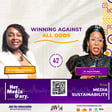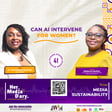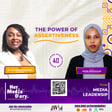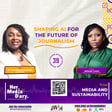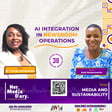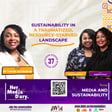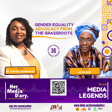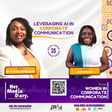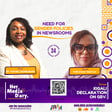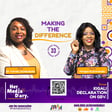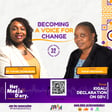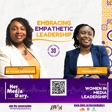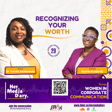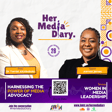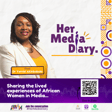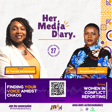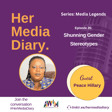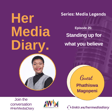Become a Creator today!Start creating today - Share your story with the world!
Start for free
00:00:00
00:00:01

SPECIAL SERIES: Labour Migration Reporting Ep 4: Why we need more women on the labour migration beat
This podcast series looks at labour migration in Africa and focuses on how women experience it on different levels. It highlights how African women experience labour migrations locally, regionally and internationally; featuring expert analysis and tips for journalists who report on labour migration issues.
In this episode we discuss:
- AWiM Co-founder and CEO Dr Yemisi Akinbobola talks about why it is important to support more women in media to get into labour migration reporting
- AWiM's partnership with Wikimedia Foundation to increase the number of African women who write and edit Wikipedia profiles, and to increase the number of notable African women profiled on Wikipedia
Hosted and produced by Andy Mkosi for African Women in Media
Read the labour migration newsletter that looks into the effect of automation on labour migration here
Explore more:
Africa Free Trade Agreement (ACTFA)
Joint Labour Migration Programme (JLMP)
AWiM's Labour Migration Reporting courses
Transcript
Introduction to Final Episode
00:00:00
Speaker
Welcome to the fourth and final episode of the African Women in Media Labor Migration Podcast, a four-part series contextualizing labor migration on the continent. I'm Andy Mkorsi, a multidisciplinary artist who is based and works in Johannesburg.
Impact of COVID-19 on African Women in Journalism and Migration
00:00:20
Speaker
This episode will summarize and highlight the most important points. We speak about the impact of the COVID-19 pandemic and how it has impacted both labor migration and journalism and what this means for the future of labor migration for African women. When women are reporting on women issues, it is reported from a place of understanding of lived experiences.
00:00:43
Speaker
So that is why that angle is really important in all of this. Co-founder and
Labor Migration's Role in Socio-Economic Divide and Peace-building
00:00:48
Speaker
CEO of Aowom, Dr. Yemi C. Akinbobola, talks to us in depth about labour migration on the continent and the importance of supporting more media women to be part of this course.
00:01:02
Speaker
Well, labor migration is a critical issue for the continent, both in terms of the social economic divide on the continent, the conflicts and peace building efforts in the continent.
Silencing the Guns: Labor Migration and Free Trade Agreement
00:01:18
Speaker
And also on the other side, you have the Africa Free Trade Agreement and that is advocated for a free movement of Africans across the continent.
00:01:29
Speaker
So I think there's a, you know, given that this year's theme at the African Union was silencing the guns and that the free trade agreement was also kind of ratified this year. So there's a lot of important themes that we could explore through the labor migration theme. So we're very pleased when the Joints Labor Migration Program contacted our to explore ways in which media
00:01:58
Speaker
can contribute to those efforts. So the Joint Labor Migration Program is a joint program between the African Union, the International Organization for Migration and the International Labor Organization. So it's a
Cross-Agency Model for Improved Reporting and Engagement
00:02:12
Speaker
cross-agency model of a program, which I think in terms of how agencies work together, it's one of those newer models of engagement across agencies for effective implementation of continental strategies.
00:02:29
Speaker
And so in terms of media, it's one, we discovered that there was not much research done on kind of labor migration reporting on the continent. And research is really important to understand the lived experiences of the journalists covering the topic so that policymakers, people with decision-making positions can actually use these to understand how better to engage
00:02:58
Speaker
media, both on the continent and international, so that labour migration issues are constructed from an African perspective and within media discourse. So it's really important that as part of that wider continental agenda to change the narrative of Africa, that we are engaging with media to reflect on how these stories are portrayed. So in terms of migration, it's usually portrayed quite negatively.
00:03:27
Speaker
media discourse and construction of narratives around migrants and refugees is often quite negative, often sometimes leading to xenophobic outcomes as well. So these kind of things are really important to reflect on how these narratives have been constructed in a way that allows for advancements and allows for agendas to address some of the challenges to foster
00:03:57
Speaker
prosper as well. But then also looking at it from the other more positive angle of that cross-country intra-Africa relations in trade and engagement and how things like the free trade agreements helps to facilitate that. Because
Visa Challenges and Personal Experience in Africa
00:04:17
Speaker
we all know that sometimes it can be more difficult for an African to get an African visa in another African country than from a non-African
00:04:25
Speaker
And if I'm going to South Africa today, I have to use my British passport because it's so difficult to get a visa in Nigeria. So there's so many issues on both sides and both positive and negative for us to really be more deliberate about how we engage with media on this. And I think particularly from the gender perspective, so we are African women in media. So our main perspective is both in terms of, well,
00:04:53
Speaker
you know, how are we supporting more women journalists to be part of that media discourse, because it's important that the gender angles are also, and women's rights angles are also reported from a perspective of understanding. And, you know, that's, you know, when women are reporting on women issues, it is reported from a place of understanding of lived experiences. So that is why that angle is really important in all of this. The African Union are
00:05:21
Speaker
our main partners here and it's through them that we work with a lot of these other agencies and programs. We worked with them last year in 2019 to deliver our conference in Nairobi. And so it's really for us a recognition that there are continental agendas and that there's a need to bridge that gap between media policy and multilateral agency relations.
00:05:50
Speaker
as well. And so, and I think also the African, you know, really eager for, for, for, you know, when you look at agenda 2063, the core of it all is about building the Africa that we want. And I think we all want that. On the other hand, media has the responsibility to, to hold people to account, you know, and to monitor the extent to which these agendas and these strategies are successfully implemented.
00:06:18
Speaker
and to the best interests of the citizens for which they've been developed. So I think both sides play a critical role, and the African Union recognizes that. And I think we are in a good position to bridge some of the gaps that exist so that media, particularly media women in Africa, are able to gain the access to the people they need to speak to in order to do their work as journalists, holding people to account
00:06:48
Speaker
And so in terms of working on the GLMP with the GLMP agencies, you know, the African union has really been the central point to coordinate that relationship. And, you know, cross agency relationships are a new model. And I think everybody's learning from how those works, but I think they have a lot of, they hold a lot of promise for actual implementation of strategies.
00:07:15
Speaker
In terms of
Collaboration with Wikimedia Nigeria: Training Women Editors
00:07:16
Speaker
Wikipedia, our main relationship there is Wikimedia Nigeria Foundation. And through them, they've been able to bring on board other Wikimedia communities, Algeria, Cameroon, Tanzania, Uganda, in order for us to facilitate the training that we've had. And it's really been a pleasure to work with Wikimedia Nigeria Foundation and their presidents, Ms. Ashley Alaudingo.
00:07:41
Speaker
And because our vision is really the same and it's, you know, all of the things that we do, our, our, uh, uh, what you call virtual projects. So we're not, it's, it's a nonprofit organizations, a non-governmental organizations, but all about trying to impact and effect change, um, in relations to African women. So the visibility projects that would do with Wikimedia, um, Nigeria foundation is really an interesting model whereby we, um, have a set of training.
00:08:10
Speaker
where we train more African women as Wikimedia editors. And that's really important because one in 10 Wikipedians are women and the numbers is even lower when it comes to African women. And again, when you look at the statistics of the number of women generally down Wikipedia, 17% of profiles of Wikipedia are that of women, 17% of women in the whole world.
00:08:36
Speaker
and the numbers are even worse in African countries. So in Nigeria, for example, there's at least 100 million women, if not more, in the country, in the country, and not to talk of the diaspora, and yet there's less than 2,000 Wikipedia profiles, and we all know so many notable women, Nigerian women, and this is just one country, so you can imagine what the six are in the other. And so the premise is that if we can increase the number of African women who are creating Wikipedia profiles, then
00:09:06
Speaker
Hopefully,
Addressing Biases on Wikipedia
00:09:07
Speaker
that will also translate in the increase in the number of African women that are profiled on Wikipedia. And through our very first project with Wikipedia in our visibility project, we're able to create between 40 and 60 new profiles, I think. I can't remember the exact number. But that's 40 to 60 more than that was previously. And if we continue to work that model that is working for us,
00:09:36
Speaker
thinking, imagine the number of African women profiles that we can produce in a year. So that relationship is really important to us because we're really trying to, it's again, connecting to that wider continental objective of changing the narrative of Africa. And I remember last year I was to speak at a conference in UNESCO about looking into the role of media in peace building and conflict resolution in the context of
00:10:05
Speaker
and UNSCF 1825. And so as part of my research for that, I Googled African war correspondence, African security, reporters, that kind of thing. And Google came up with lots of images and profiles of white Western women, you know, despite the fact that I'll actually put into the search, African women war correspondence. And so, you know, and given the way the world is, the digital era is, people would always go to Google
00:10:35
Speaker
as the first point of call to research stuff. And for me personally, I know a lot of these women myself, so even if Google couldn't give me the answers, I could put people like Asha and Will do, for example, and a few other people that I know report on security issues in Africa. But given how connected Google and Wikipedia is in terms of search results, so this is why these things are important, so that actually
00:11:02
Speaker
And for those people who would have done exactly the same Google search that I did, but who personally didn't know African women reporting on security that they could put down. Well, hopefully through our visibility project, more of those, more of the accurate search results will come up. And I think we, we, like I said, jointly with our WIM and Wikimedia 9G Foundation, we've been able to develop a workable model through which we're able to both increase the number of demographic of people who are
00:11:32
Speaker
Wikipedia editors, and in this case, African women, but then also able to increase the number of African women profiled on Wikipedia. And in its simplest form, that is what we're trying to achieve. When we go deeper, we then begin to identify other issues around how Wikipedia defines things like notability, because it's not just a case of, I want to profile my sister, and therefore I can write about my sister, and there's no vetting process.
00:12:02
Speaker
Wikipedia has very strict criteria on who makes it there. So you find that there's a lot of notable African women who should be profiled on there, but who are not. And that's largely to do with how Wikipedia defines notability and how it defines what is a credible source. In some instances, you'll find that media organizations in your country that you rely on as a credible source
00:12:28
Speaker
does not qualify for Wikipedia's interpretation of credible sources. So I think there's a lot of conversations further there for us to have with Wikipedia about how we can reflect on those definitions in order to not further disempower African women and the potentials of them to be visible online. And there's a lot of balancing in that as well, because not everybody wants to be visible.
00:12:55
Speaker
And we have to be mindful of that as well. So it's quite an interesting project to be on and a lot to reflect on after this initial year of us implementing it to see, well, what did we achieve? What were the positives, negatives, and how can we adjust? But I do know there's a lot of excitement within the wider Wikipedia community.
00:13:22
Speaker
in terms of the outcomes we've been able to achieve and the model that we've developed here. So I'm looking forward to kind of expanding it beyond what we initially started with. Dr. Ayemi, she shares with us how the Aowam organization adapted during the time of lockdown and what this meant for migration. Typically our engagements each year is centered around our annual conference. And so which obviously has to be postponed and then later converts into a virtual event this year.
00:13:52
Speaker
And so we really wanted to make sure that we were engaging with our community in other ways beyond just a conference. And that was something we had plans to do anyway. So we already had some projects that we were discussing with organizations like the African Union, UNESCO, and a few others. And so we imagined a lot of those to fit within the context of what's going on now. One of the first projects we did was around risk communication and community engagement in order to bring
00:14:21
Speaker
courses around health reporting and things like that. And I think in that process of doing that, we did quite a lot. We did quite a lot of programs this year. And considering we were small at the beginning of this year, it was just me and my co-founder and now we're a team of six. So we've had to respond quickly and grow quickly. And I think it's been a good learning curve to understand the importance of
00:14:51
Speaker
manageable projects and manageable time frames and the importance of time and the importance of doing things well in advance so that you can execute them to the best of your ability. And so hopefully from next year, building on what we've learned this year, we're going to have a more robust kind of approach to implementation of the programs. And I think it's something for all organizations of our size, of our nature to learn
00:15:19
Speaker
It's better to do one thing really well than to have multiple, multiple projects at the same time and use struggling to meet up with those. So I think that's one of the things we've learned this year. Luckily, we've been able to execute everything very well. All our partners, all our participants have been really happy with what we've done. But it's been a tiring year and I think everybody in the world needs to be just proud of whatever they've achieved, no matter how small it might seem to them because
00:15:45
Speaker
just being able to get through this year alone is an achievement in itself. I think the successes of the training and the responses we've had from participants of the training and even our conference and everything that we've done this year demonstrates that there is an need, there is an appetite, there is an urgent need for what we're doing at our
00:16:11
Speaker
You know, I started IOM as a Facebook group initially in 2016, right? And even when I started, it was because I had finished, I had just closed my own media organization. And I was looking for a space to share that experience. I was looking for a space where I could connect with other women and ask questions, ask for support. And I couldn't find that, you know? So, and even when I set up as a Facebook group, I still didn't do anything with it back then.
00:16:41
Speaker
until a few months later when I was in a media forum. And there was a lot of questions like, you know, how are we supporting more women in media? How are we going to support more African women in media? And I was like, actually, I'd set up this group called African Women in Media, and I was going to invite everybody at that forum to it. And so that's how it's really started. And each time we've had an event or we've done any activity, we've just seen that there's so much more in this space for us to
00:17:10
Speaker
to explore, to unpack in order to have that real positive change and impact. And that is all. And I think that's what the trainers and the content producers of this project should remember is that what they're doing is in order to have positive change and impact, to change the media environments, to make it more enabling for African women.
Introducing Dr. Zaira Gina and Her Migration Studies
00:17:51
Speaker
Dr. Zaira Gina is a PhD candidate in anthropology at the University of KwaZulu-Nadal and a researcher at the African Center for Migration and Society at Witz University. Her research interests and recent publications are in the field of gender and migration, mobility, labor and livelihoods.
00:18:12
Speaker
So I've been working on issues of migration studies, particularly labor migration on the continent for the last 10 years. In fact, my PhD from 2010 till 2013 was an exploration of agency amongst Somali women that moved from Somalia
00:18:39
Speaker
them to South Africa. Since then, I've been involved in various academic research projects, policy-oriented research projects, and broader scholarship in teaching around labor migration. Great. Sounds lovely. I'd just like to go back to the point that you made about Somali as well, introducing yourself.
00:19:04
Speaker
You have a publication which focuses on understanding Somali migration to South Africa. Can you maybe expand on that? Yes, I think the first thing is that that publication I think came out a few years ago, so it sort of reflected what we knew at that stage.
00:19:20
Speaker
important to keep in mind. That publication really tried to fill a gap, I think, in what we understood about African migration to South Africa at the time. A lot of it was happening on our streets and in the townships and on street corners, but there wasn't much academic literature on understanding what was going on and providing some of the statistical
00:19:44
Speaker
and analytical pieces to really piece together what we know about migration. It was also, of course, a time in these last 20, 25 years, as you know, where there was a great deal of policy uncertainty around migration. And I'm speaking about migration here quite broadly. We're talking also about what we commonly call
00:20:06
Speaker
economic migration so people who have a choice to move whether that's for work or for family or for study reasons or what's known as forced migration so this typically are asylum seekers and refugees who are forced to leave home because of war or threat of persecution or risk to their safety. So Somali migration
00:20:34
Speaker
largely refers to this latter group of migrants and they have been forced to leave home because as we know since the late 1980s early 1990s there's been significant civil unrest in Somalia, there is a civil war, there was
00:20:52
Speaker
There was a coup and there's been a great deal of political and economic instability ever since. So my work looked at this context of forced migration when people aren't able to find safety at home. What do they do?
Resilience of Somali Women in Forced Migration
00:21:11
Speaker
But it went a little bit further. So the work on Somali women in particular shows that, in fact, even within this context of forced migration, you're forced to leave everything where you are overnight having to leave your home and try to find a place of safety for yourself and your family. Even when the laws of various countries, Somalia, Kenya, South Africa, for instance, some of these key corridors of migration, if you will.
00:21:39
Speaker
laws are very restrictive. In other words, they don't provide much protection and safety for forced migrants. Even when there's, even when economic conditions on the ground are pretty difficult. So in other words, you know, there aren't many job opportunities, there isn't social protection and welfare from the government.
00:22:03
Speaker
And all of these difficult conditions, what we are finding is that Somali women, in the case of my study, were able to show really strong resiliency, right? So we should be away from this idea of the victim of the African refugee woman.
00:22:25
Speaker
Thank you so much to everyone who dedicated content and their time. It has been amazing producing and hosting Aum's labor migration podcast, a four-part series which saw us detailing different aspects of labor migration on the continent. On episode one, we heard women who shared their lived experiences of labor migration. And on episode three, Dr. Zahira Gina detailed Somali migration to South Africa. Share the podcast far and wide and let's keep the conversation going on social media.
00:22:59
Speaker
This is a limited podcast series in partnership with the Joint Labor Migration Program, the African Union Commission, International Organization for Migration, and the International Labor Organization.

